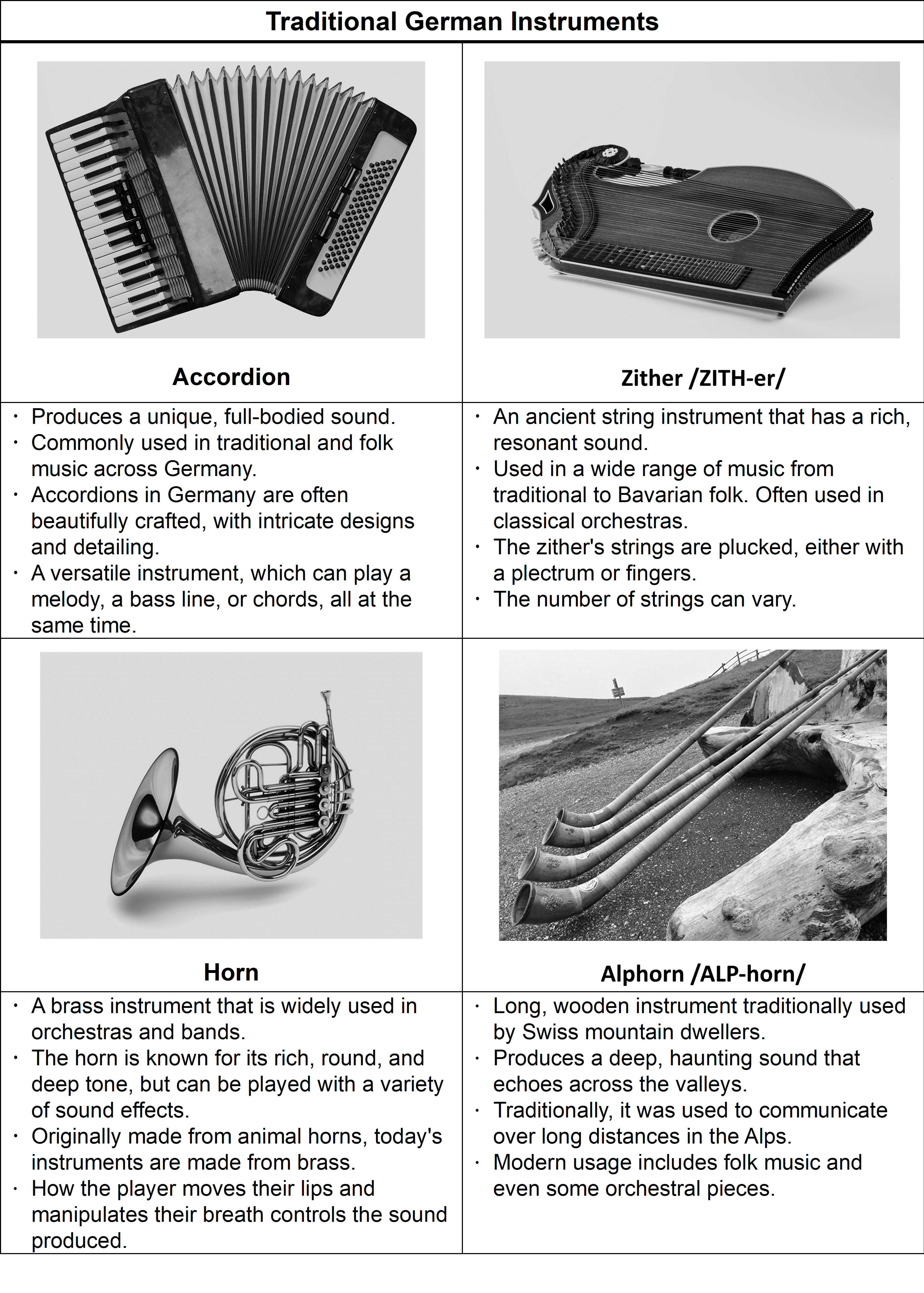

(Script; read along with character names)
Mia: We have to finish the school project this week.
David: That’s right. We’re supposed to submit it on paper next week.
Mia: We’ve already written the introduction and body paragraphs.
David: Are we done once we add a clear conclusion?
Mia: Yeah. But before we do that, let’s go over what we’ve finished so far.
| a. | They are finishing a project by tomorrow. |
| b. | They need to write and submit the project. |
| c. | They are dividing the tasks to finish the project. |
| d. | They need to add a conclusion to finish the project. |
| Answer: |
(Compliment the customer)
The answer is “d. They need to add a conclusion to finish the project.”
Please read aloud the answer sentence(s).
Good job! Let’s move on to the next.


*difference 違い

| 1. | Look at pictures 1 and 2. What is the difference between pictures 1 and 2? | |
| Answer: |
(Compliment the customer)
(This is an example answer. As long as the customer’s answer answers the questions, it is correct.)
The answer is,
———
The difference between pictures 1 and 2 is the glasses.
———
Wonderful! Let’s move on to the next.
| 2. | Look at pictures 1 and 3. What is the difference between pictures 1 and 3? | |
| Answer: |
(Compliment the customer)
(This is an example answer. As long as the customer’s answer answers the questions, it is correct.)
The answer is,
———
The difference between pictures 1 and 3 is the man’s mouth.
———



| 3. | Which picture matches the script? | |
| Answer: |
(Compliment the customer)
(This is an example answer. As long as the customer’s answer answers the questions, it is correct.)
The answer is,
———
I think picture 2 matches the script.
———
| 4. | Why did you choose that picture? Please tell me the reason and describe the picture you chose. | |
| Answer: |
(Compliment the customer)
(This is an example answer. As long as the customer’s answer answers the questions, it is correct.)
The answer is,
———
I chose picture 2 for two reasons.
First, the man is not wearing glasses.
Second, the man is speaking; his mouth is open.
———
Awesome! Let’s move on to the next.



| 1. | What percentage of people in the 20-30 age group support remote working? |
| Answer: |
(Compliment the customer)
(This is an example answer. As long as the customer’s answer answers the questions, it is correct.)
The answer is,
———
60% of people in the 20-30 age group support remote working.
———
| 2. | What percentage of people in the 50-60 age group support remote working? | |
| Answer: |
(Compliment the customer)
(This is an example answer. As long as the customer’s answer answers the questions, it is correct.)
The answer is,
———
25% of people in the 50-60 age group support remote working.
———
| 3. | Based on your answers to 1 and 2, explain what you can see in the pie chart. | |
| Answer: |
(Compliment the customer)
(This is an example answer. As long as the customer’s answer answers the questions, it is correct.)
The answer is,
———
The graph shows that 65% of people in the 20-30 age group support remote working, while only 25% of people in the 50-60 age group support it. This shows that support for remote working is higher among younger age groups.
———
You did a great job reading and describing the graph!
Let’s move on to the next.



| 1. | Both the accordion and the zither … |
| a. | are known for producing a deep, haunting sound. |
| b. | are associated with traditional and folk music. |
| c. | are made from animal horns and brass. |
| d. | are used as electronic instruments in pop music. |
| Answer: |
(Compliment the customer)
(This is an example answer. As long as the customer’s answer answers the questions, it is correct.)
The answer is,
———
“b. Both the accordion and the zither are associated with traditional and folk music.”
———
Wonderful! Let’s move on to the next.
| 2. | Which parts of the information make you think that? | |
| Answer: |
(Compliment the customer)
(This is an example answer. As long as the customer’s answer answers the questions, it is correct.)
The answer is,
———
Looking at the details, the accordion is described as being commonly used in traditional and folk music across Germany. The zither is being used in a wide range of music, from traditional to Bavarian folk. Both descriptions show their connection to traditional and folk music.
So, I think b. is the correct answer.
———


*entire すべて

|
Noah
|
When do you usually study, Olivia? |
|
Olivia
|
I prefer studying during the day. I feel more refreshed. What about you? |
|
Noah
|
I prefer the calm of the night. That’s when I focus best. |
|
Olivia
|
Really? Don’t you feel sleepy? Isn’t night meant for sleep? |
|
Noah
|
Normally, yes. But some people, like me, are more awake at night. |
|
Olivia
|
That’s interesting. But doesn’t it affect your sleep? |
|
Noah
|
It might, but I make sure to get enough sleep. |
|
Olivia
|
But we learned in biology that our bodies are meant to be active during the day. |
|
Noah
|
True, but I guess I’m an exception. |
|
Olivia
|
Aren’t you worried that studying during the day might be healthier? |
|
Noah
|
That might be true for many, but I’ve found what works for me. |
|
Olivia
|
Hmm, I see. Everyone’s different. |

| 1. | What are they talking about? | |
| Answer: |
(Compliment the customer)
(This is an example answer. As long as the customer’s answer answers the questions, it is correct.)
The answer is,
———
They are talking about whether studying at night is a good idea.
———
| 2. | Between Noah and Olivia, who agrees and who disagrees with studying at night as a good idea? | |
| Agree: | ||
| Disagree: |
(Compliment the customer)
(This is an example answer. As long as the customer’s answer answers the questions, it is correct.)
The answer is,
———
Noah agrees with studying at night as a good idea.
Olivia disagrees with studying at night as a good idea.
———
| 3. | What is one of the opinions in the conversation that agrees with studying at night as a good idea? |
| Answer: |
(Compliment the customer)
(This is an example answer. As long as the customer’s answer answers the questions, it is correct.)
The answer is,
———
I prefer the calm of the night.
———
| 4. | What is one of the opinions in the conversation that disagrees with studying at night as a good idea? | |
| Answer: |
(Compliment the customer)
(This is an example answer. As long as the customer’s answer answers the questions, it is correct.)
The answer is,
———
We learned in biology that our bodies are meant to be active during the day.
———
| 5. | If you agree with studying at night as a good idea, what do you think is a good point? | |
| Answer: |
insert hint if needed
insert hint if needed
(Compliment the customer)
(Any customer’s answer(s) is/are correct.)
| 6. | If you disagree with studying at night as a good idea, what do you think is a bad point? | |
| Answer: |
insert hint if needed
insert hint if needed
(Compliment the customer)
(Any customer’s answer(s) is/are correct.)
| 7. | Finally, please tell me your opinion. Do you agree or disagree with studying at night as a good idea? |
| Answer: |
I agree. / I disagree. Because ____________________________________. |
(Compliment the customer)
(Any customer’s answer(s) is/are correct.)




|
What do you think are the benefits of studying at different times of the day? Do you find it easier to study in a quiet environment? How do you stay focused and motivated when studying for long periods? |
| Answer: |
